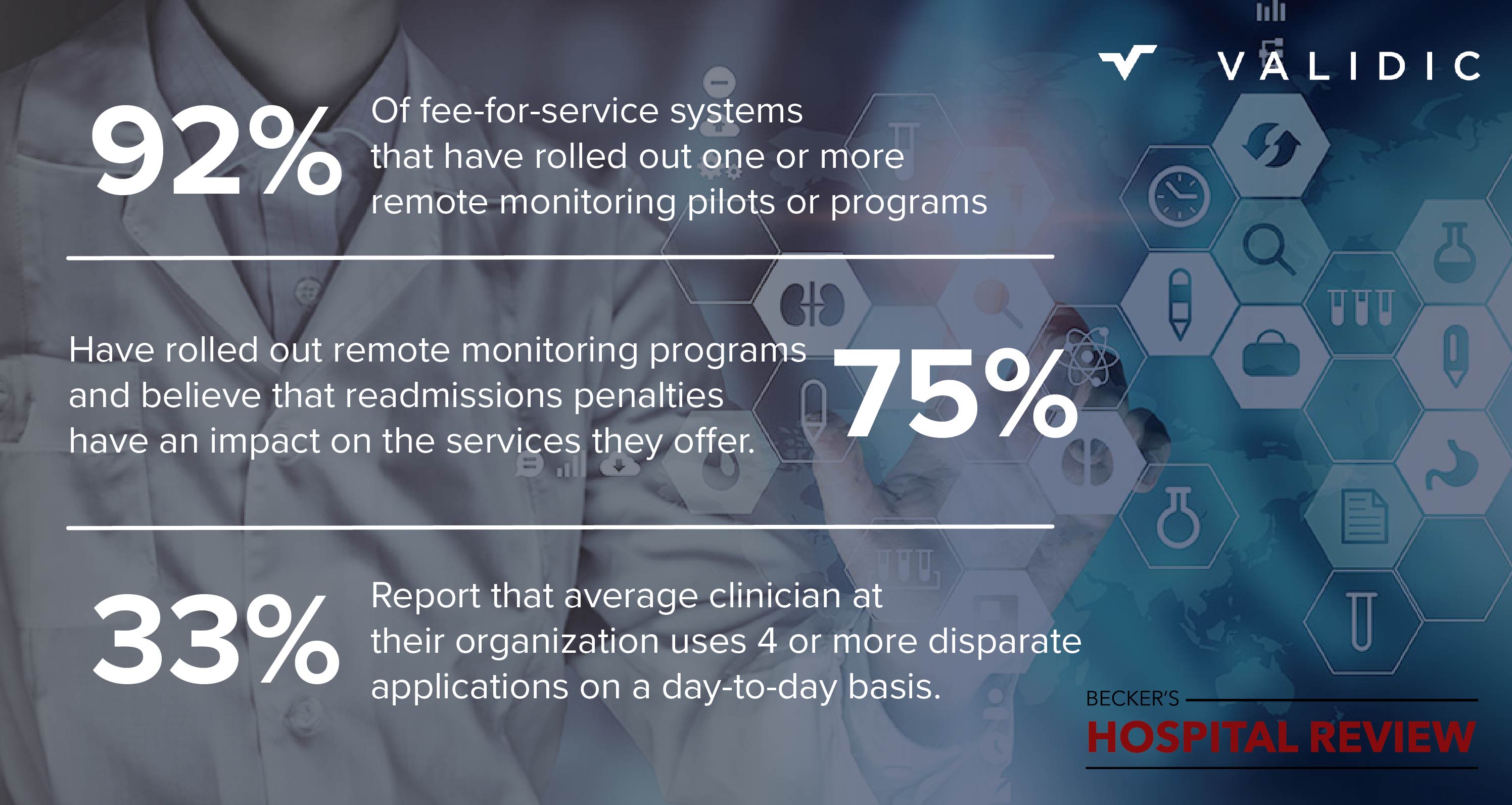CHICAGO and DURHAM, N.C. -- Nearly 53 percent of provider organizations are piloting and deploying remote monitoring and virtual care programs – driven increasingly by expanding reimbursements and avoiding readmission penalties.
This is according to new survey data released by Validic, the leading platform for patient-generated health data integration and analysis, and Becker’s Hospital Review, the leading source of cutting-edge business and legal information for healthcare industry leaders, today.
Read the full survey report here.
Though the majority of providers surveyed already offer remote monitoring programs or pilots, financial challenges were cited as a notable barrier, especially for organizations looking to scale remote monitoring programs beyond pilots. Additionally, poor system interoperability continues to be a challenge for many health systems. Nearly 34 percent of respondents cited that the average clinician at their organization used four or more disparate applications on a day-to-day basis – indicating that implementing a remote monitoring program, which effectively operates within existing clinical systems, is critical.
The survey of over 100 health system executives and leaders found that nearly 72 percent of providers are considering rolling out or have rolled out remote monitoring pilots or programs. The survey delves into respondents’ greatest challenges with implementing programs, such as lacking senior leadership support and data standards confusion; as well, respondents offer insight into the promise that new financial models and reimbursement opportunities offer provider institutions.
In addition to the results from the survey, two healthcare leaders – Tufia C. Haddad, MD, chair of IT for the oncology department and medical oncologist at Mayo Clinic, and Dr. Martin Entwistle, president and CEO at Ares Health Systems – shared their insights on new and developing opportunities in healthcare to overcome legacy technical, financial and operational challenges.
Based on the results, fundamental practices for successful implementation include:
• Strong operational deployment and programming. Health systems investing in proper education of stakeholders, measurable goal setting, and aligned strategic deployment of remote monitoring are driving higher levels of personalized patient engagement and improved outcomes.
• Integration of data into the clinical system. Given that providers are already working with several disparate systems in a given day, integrating patient-generated health data and remote monitoring protocols directly into the electronic health record can improve the efficiency of care management by streamlining existing workflows.
• Use of new financial models and opportunities for reimbursement. Organizations moving toward risk-based payment models or taking advantage of new remote monitoring reimbursement codes from the Centers for Medicare and Medicaid Services (CMS) are seeing financial returns on investment with data-driven care.
“With the technology and financial support available today, health systems have more opportunities than ever to execute on data-driven remote monitoring programs to deliver comprehensive care to the most at-risk patients,” said Drew Schiller, CEO, Validic. “As remote monitoring programs continue to develop, providers are increasingly well-equipped to deliver meaningful care which improves quality of life for all patients.”
To learn more, read the full survey report here.

About Becker’s Hospital Review
Becker's Hospital Review (part of Becker's Healthcare) features up-to-date business and legal news and analysis relating to hospitals and health systems. Content is geared toward high-level hospital leaders. Becker's provides valuable content, including hospital and health system news, best practices and legal guidance specifically for these decision-makers.
About Validic
Validic guides healthcare organizations through the technical complexities associated with accessing and operationalizing patient-generated health data. Validic's scalable, secure solutions help you improve operational efficiency and patient outcomes by delivering personal health data from hundreds of home health devices seamlessly into your existing clinical workflows. To find out how healthcare is innovating to create more data-driven and integrative healthcare experiences, visit validic.com or follow Validic on Twitter at @validic.
